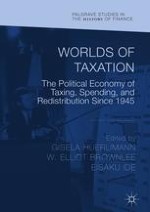2018 | OriginalPaper | Buchkapitel
Limits to Redistribution in Late Democratic Transitions: The Case of Spain
verfasst von : Sara Torregrosa Hetland
Erschienen in: Worlds of Taxation
Aktivieren Sie unsere intelligente Suche, um passende Fachinhalte oder Patente zu finden.
Wählen Sie Textabschnitte aus um mit Künstlicher Intelligenz passenden Patente zu finden. powered by
Markieren Sie Textabschnitte, um KI-gestützt weitere passende Inhalte zu finden. powered by
